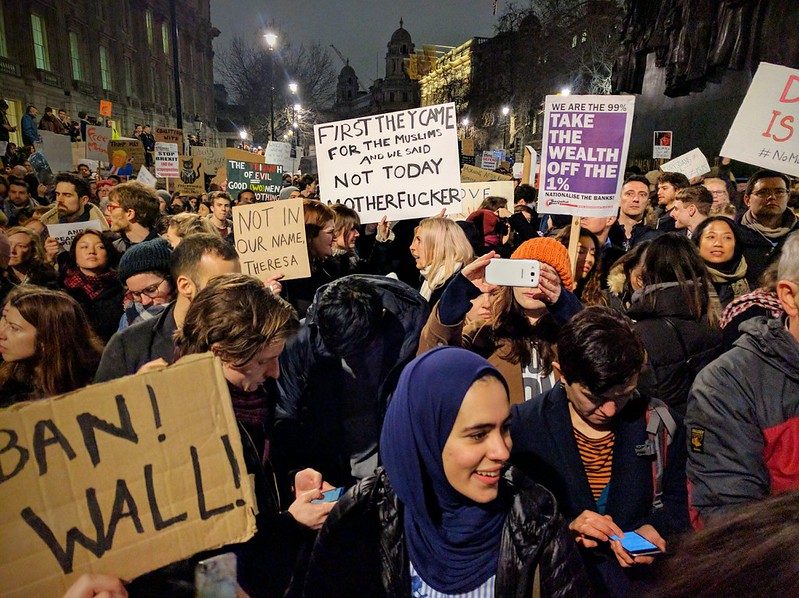In this article, Braxton Haake, Law Fellow for the Rutgers Center for Security, Race and Rights, and Sahar Aziz, professor of law at Rutgers Law School, reflect on some of the main results found at recent Rutgers Center’s study on justice proceedings towards Muslims in the USA since 2001. The study shows the difficulties faced by the country’s Muslim population to battle its cases before a jury.
A seismic shift befell American politics after the September 11 attacks, and 19 years later, Muslim Americans are still dealing with the aftershocks.
Most people are familiar with the so-called war on terror’s targeting of Muslims as well as anti-Muslim discrimination in the public sphere in the United States. But few know of Muslims’ difficulty in attaining justice in American courts in either of these cases.
In post-9/11 America, thus, Muslim plaintiffs face a nearly insurmountable battle to try their case before a jury of their peers.
As part of an ongoing study by the Rutgers Center for Security, Race and Rights, we reviewed 175 Muslim civil rights cases filed across the US since 2001 and found that only 17 percent of claims made it to trial, with most cases dismissed by judges in the pre-trial phase. Our preliminary findings point to a troubling trend: not only have Muslims experienced more discrimination since 2001, but they have also not been able to find meaningful relief in the courts.
While most civil rights violations rarely proceed to litigation due to the prohibitive cost of retaining a lawyer, the success rate of those which do remains abysmally low. This outcome, which plagues civil rights cases in general, is due in part to the judges’ gatekeeping role in the litigation process.
The Civil Rights Act of 1964 prohibits discrimination based on religion or ethnic origin, which are the most common cases filed by Muslims. Discrimination cases are already hard to win because judges consistently read anti-discrimination law with high deference towards employers, supervisors and law enforcement. In cases filed by Muslims, the judges’ exercise of discretion pre-trial demonstrates an ignorance at best, or callousness at worst, of discrimination experienced by Muslim communities.
Discrmination in employment cases
In post-9/11 America, thus, Muslim plaintiffs face a nearly insurmountable battle to try their case before a jury of their peers, despite rising Islamophobia in society.
Take the case of Skwikar Ali Abdelkader in Maryland. For seven years without incident, she took Fridays off from her job at Sears to observe the Muslim Sabbath. In 2007, her supervisor suddenly demanded that she come in to work on Fridays, notwithstanding her long service to the company. When Abdelkader sued her employer, the judge flippantly noted that she could have used her vacation days to take Fridays off.
Never mind that Abdelkader was not asked to use her vacation days during the first seven years of her employment or that the average American worker gets a paltry 10 days paid vacation per year. Neither of these considerations mattered enough for the judge to take seriously this Muslim woman’s request for religious accommodation to allow her to have her day in court before a jury. Instead, the judge accepted the employer’s rendition of the facts and dismissed Abdelkader’s case.
Anti-Muslim discrimination cases alleging a “hostile work environment” have often met the same fate. When a workplace is “permeated” with discrimination, ridicule and insult, and the discrimination is “severe or pervasive” enough to affect the victim’s work, the workplace is unlawfully hostile.
On its face, this legal protection should be a useful tool to fight discrimination, but courts rarely decide that words alone are enough to produce a hostile environment. Even taunts that a Muslim employee is “Taliban” or “Al-Qaeda”, or that they were responsible for the 9/11 attacks have been held insufficient.
Judges have used the “severe or pervasive” requirement to dismiss filed lawsuits because they deem the anti-Muslim discrimination too “episodic”, even in cases where such discrimination persists for five years. Worse yet, when the discrimination is found to be “severe or pervasive”, some cases have been dismissed if a plaintiff is able to do their work, despite the discrimination.
Judges have used the “severe or pervasive” requirement to dismiss filed lawsuits because they deem the anti-Muslim discrimination too “episodic”.
In other words, if a Muslim worker is resilient enough to work through the hostility, that will be used against her in court. This is nothing short of a Muslim tax.
Muslim plaintiffs’ intersectional identities can also be used against them by the court. For example, an Egyptian Muslim plaintiff’s racial discrimination case was dismissed because neither his Egyptian nor his Muslim identities qualified as a “race” for the purpose of anti-discrimination law.
This decision completely ignores the reality that race is an arbitrary social construct, and that Islamophobia is a type of racism even though Islam is not a race. Many Muslims in the United States are discriminated against for the colour of their skin, too, even if they cannot be neatly categorised into a common racial descriptor like “Black” or “White.”
Judicial discrmination and Islamophobia
These troubling trends are not limited to employment cases; the American judicial system has proven to be unfriendly to Muslim victims of discrimination in a myriad of contexts.
From Muslim inmates being refused a halal diet, to worshippers being afforded “diminished privacy” when inside places of prayer, to mosques being refused building permits because they would somehow affect the “historic” or “stable” nature of the neighbourhood, discrimination proceedings are stacked against Muslim plaintiffs across the board.
A case in point is Abdulrahman Cherri, who brought a retaliation claim against the FBI for subjecting him to unfair and discriminatory questioning at the border. The court dismissed Cherri’s claim because the questioning did not injure Cherri enough to “deter” him “from further participation” in his faith. Put another way, if Cherri were actually hurt by the US government, he would have given up Islam to avoid further questioning.
In a country where free exercise of religion is protected by the constitution, it is nothing short of un-American to bar a Muslim from recovery because he refused to give up his faith.
The problem is not the law per se, but judges who have been socialised by the media and American culture to discount the dignitary harms experienced by Muslims facing discrimination. A lack of empathy for pain suffered by minorities is a common consequence of systemic racism.
Nineteen years after the 9/11 attacks, the American justice system continues to be stacked against Muslim plaintiffs as the rate of documented anti-Muslim attacks remains high.
Source: Aljazeera

















No Comments